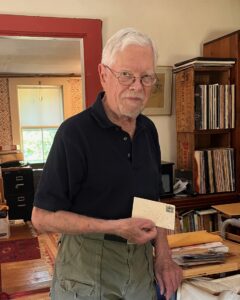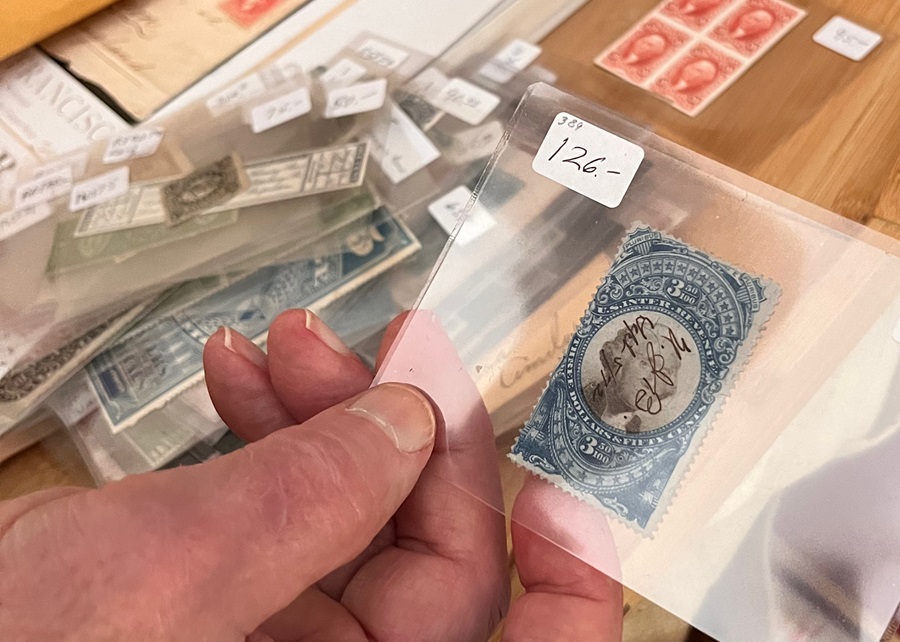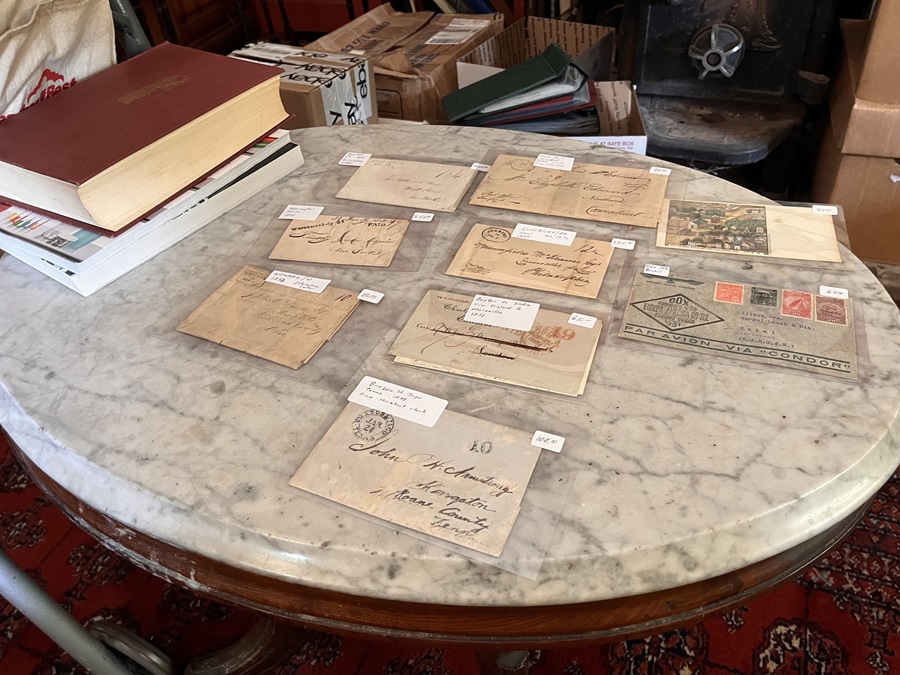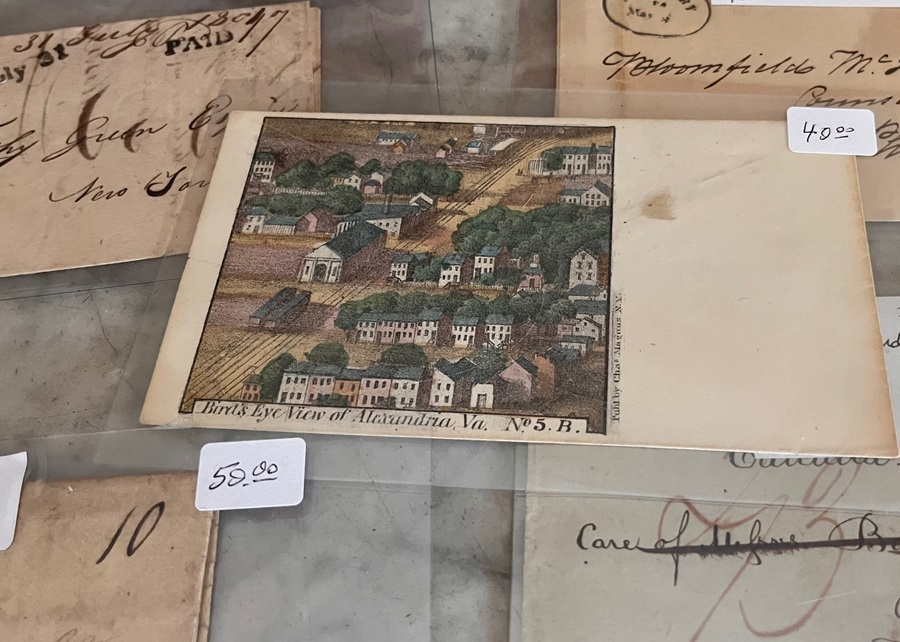Hugh Daugherty lingers under the low doorjamb of his 19th-century house in Eastham on a sunlit afternoon before he turns and leads the way through his office — what used to be the dining room — and into the living room.
His office is given over to boxes of philatelic materials. There are auction catalogs, binders filled with laminated pages of drawings, boxes full of stamps, and books of history. Daugherty used to sleep in the upstairs bedroom, he says, but that room is now reserved for another purpose: it’s “chockablock full,” he says, of a collection of stamps given to him by another stamp collector and seller, Stanley Richmond. In the mid-1960s, Richmond purchased the Daniel F. Kelleher philatelic auction company in Boston and ran it for over 50 years.

“He was supposedly going to retire,” Daugherty says of Richmond. “That didn’t happen.” Instead, Richmond kept an office in the Boston suburbs from which he continued buying and selling philatelic material. Sometimes he’d call Daugherty to offer him stamps. “While I’m loading the car up with his stuff,” says Daugherty, “he’s on the phone to Europe, buying more.”
Richmond, who was the first person ever to pay more than $100,000 for a U.S. stamp (an inverted Jenny), “just wouldn’t stop,” says Daugherty. Richmond was in his 90s. “It got to the point where his family said, ‘Enough, Stanley.’ They had to take his phone away!”
Daugherty came to the Cape in the early 1960s after joining the Coast Guard, which sent him to Woods Hole. “The draft board was breathing down my neck,” he says. “I didn’t want to join the Army. I wanted to go to sea.” When he was discharged from the Coast Guard, he got married and took a job at the Woods Hole Oceanographic Institution. But after an accident that resulted in a fused ankle, he started a part-time stamp business. The collection he tends now grew from there.

Daugherty navigates back around the coffee table to the fireplace, where the marble mantle is a collector’s item in itself, says Daugherty. “We found it in a recycling building-supply place. It was a perfect fit.” On it rests an unframed photo: Daugherty and Claudia Bartlett. “My other half,” he says. She died in 2012.
The two met in Lowell at a conference of the Coast Guard Auxiliary. But Daugherty’s philately intrigued her, too. The picture shows Daugherty and Bartlett manning their booth at a philatelic show in Houston, Texas — “of all places,” adds Daugherty.
Collecting and selling, he traveled around the Boston area for auctions at philatelic shows. Now, at 83, he says he’s starting to slow down. But he’s still a licensed and bonded auctioneer, working mostly from here, collecting bids by mail, email, and through online forums, and buying and selling rare and valuable stamps.

His personal collection includes material that has to do with Cape Cod postal history. And he’s got Civil War-era revenue stamps showing that a tax or fee has been paid to the government. “Nowadays, we put war on a credit card,” says Daugherty. But in 1862, faced with the challenge of funding the Civil War, President Lincoln signed the Revenue Act of 1861 into law: the first income tax in the U.S. “How Lincoln ever got that through Congress, I have no idea,” he says.
Daugherty has centuries-old pre-stamp covers, sent to and from land and ships at sea. The first postage stamps were introduced in the U.S. in 1847. Before that, covers, often marked by hand, showed all the necessary information. “Rates were very complicated in those days,” says Daugherty, “depending on how many sheets of paper and the distance it went. To send a letter from here to Boston, it would cost you 10 cents. From here to New York, it could be 18 and a half cents. They did it by the half-cent back then.”

As a child, Daugherty lived in a New York City apartment across from the Columbia University president’s house. Dwight D. Eisenhower was Columbia’s president at the time — he resigned from that job in January 1953 after being elected president in November 1952. Daugherty collected baseball cards and comic books. “My mother said, ‘Why don’t you collect something smaller?’ ”
He turned to stamps. “King George V had a fabulous collection,” he says. “And FDR collected stamps.” The FDR collection was auctioned by H.R. Harmer, Inc. in 1946. Daugherty knew someone whose father dealt with President Roosevelt and who told Daugherty that Roosevelt was the best underbidder he’d ever known.
The stamps themselves are indeed small — some no bigger than the tip of a thumb — and engraved with lacy cursive letters so minuscule that they’re nearly illegible.
But their history is huge, and that’s the part Daugherty loves most. He unfolds one item in his collection with practiced care: a Civil War-era envelope.
“It’s homemade, out of an older ledger sheet,” he says. “They were running out of paper.”
Editor’s note: An earlier version of this article, published in print on Aug. 29, incorrectly reported that Hugh Daugherty lives in an 18th-century (not 19th-century) house and that he first came to Cape Cod to join the Coast Guard. He had joined the Coast Guard in New York and was sent to the Cape.



